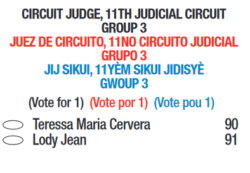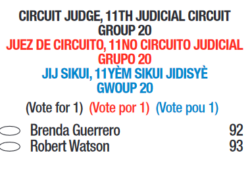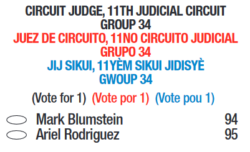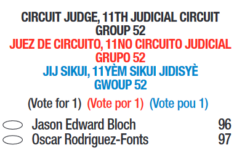Absentee ballots are out, so it’s time for some recommendations for the upcoming judicial elections which will be held on August 23, 2022, the same date as the partisan primary elections. Please vote. And remember that even a lot of people who turn out on primary day don’t bother to fill in the judicial part of the ballot. So your vote really counts.
Unlike most law professors I know, I support the idea of judicial elections at the state level as a reasonable democratic check on what I believe should be the expansive power of judges to interpret the state and federal constitutions.
As I’ve often said before, if it were up to me, I’d have the executive branch pick judges with legislative confirmation, followed by a California-style retention election every few years in which there would be an up or down vote on the incumbent. If the vote was down, the executive would pick a new judge. It seems to me that the right question is “has this judge done a good (enough) job” — something voters might be able to figure out — rather than asking voters to try to guess from electoral statements which of two or more candidates might be the best judge.
Florida’s system uses appointment plus retention elections for Supreme Court Justices and District Court of Appeal Judges, but not for trial courts. The Governor can appoint judges to fill vacancies between elections, but otherwise those jobs are straight up elected, so this election pits one or more challengers against the incumbent unless, lacking opposition, the incumbent wins reelection automatically; 19 (!) Circuit Court judges and 12 (!) County Court judges were indeed unopposed this year.
This year we have four Circuit Court races and three County Court races in August. Both are trial courts, but with different jurisdiction. All seven races pit a challenger against a sitting judge. Retention elections for the higher courts will be on the November ballot, as would runoffs if any of the trial courts had had any multi-candidate races.
Here’s what my recommendations are based on:
- My personal view is that I will vote for an incumbent judge unless there’s reason to believe they’re doing a bad job and the challenger would do better. Fortunately, that only happens occasionally. But as you will see below, it does happen….
- After supporting incumbents, my other rule of thumb in sizing up candidates before even getting to the details of biography and practice experience is that in all but the rarest cases of other important life experience we ought to require at least ten years of legal experience from our lawyers before even considering them as judges. Fifteen years is better. I will very rarely support a judicial candidate fewer than ten years out of law school. It just isn’t enough to get the experience and practical wisdom it takes to be a judge.
- I look to see if the candidate filed a voluntary self-disclosure form with the state. Many don’t.
- I’ve become decreasingly reliant on third party sources. I used to rely a lot on the Dade County Bar Association Poll in which lawyers rate the candidates’ qualifications. But the response rate is low enough that I’ve come to wonder about it; that said, if there’s a large majority one way or the other that tells me something. Sometimes, I’ll also look at the Cuban Bar Association poll also, although again the turnout isn’t amazing.
- Similarly, I’ve soured on the reliability of endorsements. Where once SAVE Dade seemed like a fairly reliable guide, now rebadged as SAVE, it doesn’t seem to me to be as reliable as I used to think it was, in light of a string of I thought erroneous endorsements.
- The Miami Herald makes endorsements. In the case of elected officials I think the decision-makers there are so terrified of annoying establishment candidates that their endorsement only means something if they buck an incumbent. And when did that last happen? But in the case of judicial races, I’ve come to think maybe they do a better job.
- And oh yes, I read local blogs. Pre-COVID I would listen to gossip too, but I don’t get out so much these days.
- Last, but very far from least, I think any campaign that is benefiting from third-party slime-ball mailers, and fails to denounce them instantly, is worth voting against for that reason alone. Note that this rule does not apply categorically to a hypothetical negative mailer authorized and signed by a campaign. If a campaign is willing to go negative on the record, then it depends on the accuracy and relevance of what they are saying. But that doesn’t happen very often.
Circuit Court
Group 3: Re-elect Judge Lody Jean
 The Group 3 race pits incumbent Judge Lody Jean against challenger Teressa Cervera. Despite four years of experience, this is Judge Jean’s first election: Gov. Rick Scott appointed Jean to the County Court in 2018, and Gov. Ron DeSantis elevated Jean to the Circuit Court in 2020.
The Group 3 race pits incumbent Judge Lody Jean against challenger Teressa Cervera. Despite four years of experience, this is Judge Jean’s first election: Gov. Rick Scott appointed Jean to the County Court in 2018, and Gov. Ron DeSantis elevated Jean to the Circuit Court in 2020.
Judge Jean has, AFAIK, performed ably on both courts, and she deserves to be elected, or re-elected (depending how you see it).
My opinion that Judge Jean should be retained does not turn on the the fact that she is the first Haitian-American woman on the Miami-Dade Bench, although I suppose that might influence some voters. Nor is it (much) swayed by the kerfuffle over challenger Cervera’s alleged attempt to play the Miami name game. The Miami name game is a long-abused practice in which candidates who have practiced under non-Hispanic, usually Anglo, names, suddenly hyphenate or change their names to something Hispanic in order to run for judge on the — sadly justified — theory that some low-information voters will vote for Hispanic names over others. It’s not a good look for a would-be judge. “Teressa Cervera” practiced law since 2012 under the name “Teressa Tylman”. But, unlike some candidates who have played the name game in the past, at last Cervera/Tylman can fairly say that Cervera is and has been her legal married name.
No, the problem with Cervera/Tylman isn’t her name. It’s her resume. She just lacks key legal experience relevant to being a trial judge — she has never, it seems, tried a single case to a jury. That’s a big deal. (C/T suggests that “hundreds of hours” of evidentiary hearings makes up the shortfall. It doesn’t.)
Judge Jean’s solid performance would be enough for me; the case is more than closed by the challenger’s lack of a relevant experience.
Vote line 91 – Lody Jean.
Group 20: Re-Elect Robert Watson
 Group 20 pits another previously unelected incumbent, Judge Robert Watson, against a (this time, competent) challenger … with a Hispanic name. Watson was an Assistant U.S. Attorney for five years, and then in private practice for five years before Gov. DeSantis appointed him to the County Court in 2019, and then to the Circuit Court in 2020. His challenger Brenda Guerrero, formerly known as Brenda Gitchev Guerrero, at least has significant trial experience, although she did not file a self-disclosure statement with the bar. Her campaign website describes her experience as:
Group 20 pits another previously unelected incumbent, Judge Robert Watson, against a (this time, competent) challenger … with a Hispanic name. Watson was an Assistant U.S. Attorney for five years, and then in private practice for five years before Gov. DeSantis appointed him to the County Court in 2019, and then to the Circuit Court in 2020. His challenger Brenda Guerrero, formerly known as Brenda Gitchev Guerrero, at least has significant trial experience, although she did not file a self-disclosure statement with the bar. Her campaign website describes her experience as:
I graduated from St. Thomas University School of Law and have worked for nearly twelve years in public service. I began my career as an attorney in Legal Aid, working for two years helping low-income individuals meet basic needs, removing barriers to justice through civil legal assistance. Then I worked as a Miami-Dade County Assistant State Attorney for nearly ten years protecting the rights of our children. After several years working as a private attorney and litigating over 1500 trials to verdict, I now seek to work as a Circuit Court Judge in public service.
Pretty good resume. And we can always use more former Legal Aid lawyers on the bench. If this were an open seat, I might be tempted to vote for Guerro. But I’m still going with the very competent incumbent.
Vote Line 93 – Robert Watson
Group 34: Elect Challenger Ariel Rodriguez
 This is a case where I think we should replace a sitting judge. Incumbent Judge Mark Blumstein is challenged by Ariel Rodriguez, a bankruptcy attorney. When Mark Blumstein ran in a four-way race in 2016, I wasn’t a fan. The deciding factor against Blumstein was his excessive use of photos of him in his Navy uniform. Maybe not strictly illegal, but not savory. The voters saw otherwise.
This is a case where I think we should replace a sitting judge. Incumbent Judge Mark Blumstein is challenged by Ariel Rodriguez, a bankruptcy attorney. When Mark Blumstein ran in a four-way race in 2016, I wasn’t a fan. The deciding factor against Blumstein was his excessive use of photos of him in his Navy uniform. Maybe not strictly illegal, but not savory. The voters saw otherwise.
Now, Blumstein is up for re-election and unfortunately, he’s still pushing photos of himself in a navy cap, even though he’s no longer a JAG. I see it on billboards. I don’t like it. Blumstein also has made some controversial decisions leading to reversals, most notably empaneling a six-person jury in a murder case over the objections of both the prosecution and the defense. That lead to an emergency appeal, and a summary smackdown by the 3rd DCA. There’s been several other reversals too, but that alone is quite telling.
Challenger Ariel Rodriguez has a slightly different background from the typical candidate. Here’s key parts of his website’s summary of his credentials:
Ariel Rodriguez is a federal government attorney who has been practicing for almost twenty-three years in the areas of commercial litigation and bankruptcy.
[…] He earned his […] law degree, cum laude, from Notre Dame Law School. [ … ]
He has served as a Guardian ad Litem in the Eleventh Judicial Circuit, and a guest lecturer for the Cuban American Bar Association’s Civility and Professionalism Committee, […] and for local universities. Ariel is also a member of the Federalist Society and Miami Dade Bar and a director of the Miami Catholic Lawyers Guild.
The Federalist Society is not my favorite credential these days, but I don’t think it’s as big an issue for a trial judge as for, say, the Florida Supreme Court (where, currently, it appears to be a prerequisite to nomination, but that’s another story).
The trouble is, I think Blumstein hasn’t shown he deserves retention; Rodriguez sounds more than competent, and is certainly experienced.
So, I suggest you vote line 95 for Ariel Rodriguez.
Group 52: Tough Call

Incumbent Oscar Rodriguez-Fonts is challenged by former Judge Jason Bloch. There are some reasons to be dubious about both candidates.
When Rodriguez-Fonts ran for Circuit Judge in 2014, I endorsed the other guy. In 2016, when Rodriguez-Fonts ran again, I said it was a close call, but endorsed his opponent; Rodriguez-Fonts won that one. Now he’s up for re-election.
The biggest knock on Judge Rodriguez-Fonts is that the very day after the US Supreme Court handed down the Dobbs decision reversing Roe v. Wade, the sitting Judge made a (long-planned) appearance at Christian Family Coalition Florida’s annual Legislative Victory & Candidates Breakfast where he made a short speech. The Miami Herald quotes the CFC’s Twitter feed as calling the event “a morning of rejoicing”; its article described the event as:
A who’s who of South Florida Republicans and conservative activists filled a hotel ballroom that was brimming with unapologetic pride the morning after the U.S. Supreme Court decision to overturn the 1973 landmark Roe v. Wade ruling that gave women the legal right to have an abortion.
“I just want to say that this morning, you woke up in a nation that is pro-life,” said Anthony Verdugo, the founder and executive director of the Christian Family Coalition Florida.
The crowd — which included Lt. Gov. Jeanette Núñez, Republican state House members, leaders from Miami’s right-wing Moms For Liberty group and other GOP candidates running for county and state office — burst into cheers and applause.
Was this a proper thing for a judge to do? The speech was reported as “non-political,” so it’s not a per se ethics violation. The timing was accidental — but atrocious. On the other hand, not going would surely have been seen by an important voting block as a snub. Even so, attending and speaking was, to say the least, pretty tone-deaf under the circumstances. It can’t help but make you wonder about his judgement–or his guts to do the unpopular thing which would have been not speaking.
It would be easier to counsel against voting for Rodriguez-Font if only his opponent was better. Jason Bloch has shown some poor judgement too. After being appointed to the bench, and apparently doing a perfectly fine job there, he faced one of the least qualified candidates to run for judge in some time. He not only ran a bad campaign, he sued his opponent for failing to disclose her financial interests in an erotic hotel. She won anyway (Hispanic name?) and became Judge Marcia Del Ray; sadly she got re-elected this year without an opponent. Meanwhile Bloch lost his lawsuit; the judge in that case said it should have been an ethics complaint not a lawsuit.
For what it’s worth, Bloch is independently wealthy (very), and has spent much of his time since 2016 doing pro bono work for nonprofits and in eviction cases. He’s a board member of Legal Services of Greater Miami. (Rodriguez-Fonts was an Assistant City Attorney and and Assistant Public Defender before becoming a judge.)
So both candidates could be accused of poor judgment at one point or another in their careers. Both have other virtues. Both seem to have done decent jobs of running a courtroom.
The Herald endorsed Bloch. So did the Miami-Dade League of Prosecutors and SAVE. The Christian Family Coalition gave Rodriguez-Fonts its highest ratings; the police and some other unions endorsed him too.
I think it’s actually a hard call. I will probably vote for Bloch, but I’m wavering.
In Part II, coming soon, I’ll discuss the three County Court elections. Stay tuned for the attack mailers….

 Absentee ballots are out, so it’s time for my guide to judicial elections. I’ve been fighting a (non-COVID!) cold, so I’m behind schedule. And I probably need to cut my screed on all the reasons you should vote line 99 to retain Judge Seraphin….most of which are about all the reasons you should NOT (please please please don’t) vote for his unfit challenger, political animal Renier Diaz de la Portilla.
Absentee ballots are out, so it’s time for my guide to judicial elections. I’ve been fighting a (non-COVID!) cold, so I’m behind schedule. And I probably need to cut my screed on all the reasons you should vote line 99 to retain Judge Seraphin….most of which are about all the reasons you should NOT (please please please don’t) vote for his unfit challenger, political animal Renier Diaz de la Portilla. And this gem from the NYT’s
And this gem from the NYT’s  I was reading a long and complicated contract that I was thinking of signing (details are NDA’d, so don’t ask), and I came upon this piece of contemporary drafting:
I was reading a long and complicated contract that I was thinking of signing (details are NDA’d, so don’t ask), and I came upon this piece of contemporary drafting: In general, I’m of the view that we have too many jails and prisons (and far too many private prisons!), and that this is an industry, or social practice if you prefer, where supply tends to create demand for reasons economic and social.
In general, I’m of the view that we have too many jails and prisons (and far too many private prisons!), and that this is an industry, or social practice if you prefer, where supply tends to create demand for reasons economic and social.